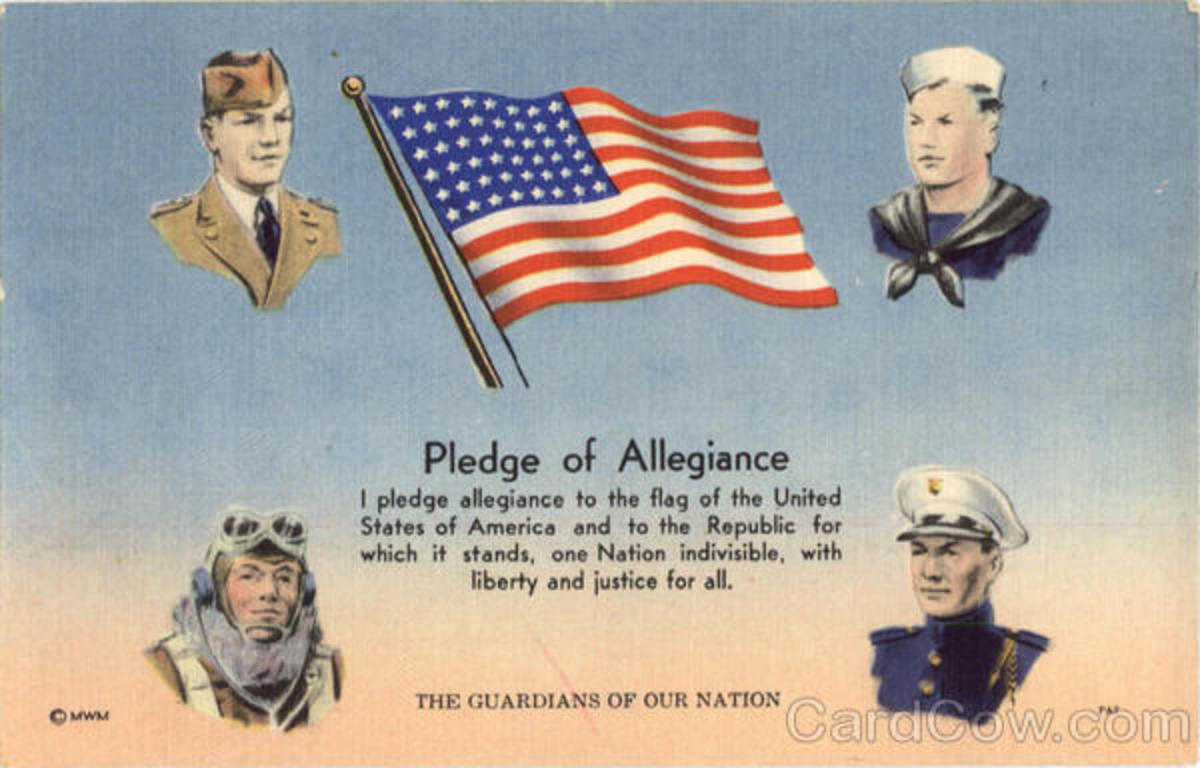Under God

I Pledge Allegiance!
What would cause a country for which it stands to debate whether or not we should recite the “Pledge of Allegiance?” Two small words: “Under God.”
The lines of this debate are made clear whenever you pose this question to American citizens walking on any of its bustling streets, sidewalks, and thoroughfares. Either there is great conviction to honor the words “Under God” in our pledge allegiance or to take the words “Under God” out of the pledge allegiance and simply not say it at all!
The argument against having elementary, middle school, and high school children from reciting the pledge is that the school system is imposing Christian values on others who are not receptive. This includes those of other ethnic groups and religious culture. Following you will find the opinion of a judge that sits on the bench in the 9th Circuit, “When school teachers lead a recitation of the Pledge of Allegiance according to school district policy, they present a message by the state endorsing not just religion generally, but a monotheistic religion organized 'under God” (Judge Alfred T. Goodwin Majority Opinion, 9th Circuit, Newdow v. U.S. - 6/26/02). His opinion is one that resounds, amazingly, among the law community. You will find that this argument often leads to the support of separation of Church and State, 1st Amendment Rights, and usage of the Pledge without the inclusion of the words “Under God.”
Since we were examining the Pledge of the Allegiances’ affect on the students, I thought we should take a look at what happens in schools across the nation. I came across an interesting reason from a student as to why he does not recite the Pledge: “Some don't stand because as Stallings says, students don't see America as their true home. "This isn't my home country; that's El Salvador," says junior Yendil Furcal.” Another said: “"I don't care [about standing] because I'm lazy," comments sophomore Eli Simon-Mishel. This student stated: "Kids are just lazy about the pledge. They don't care," says Junior Raheisha McDaniel. Yet another student replied: "Why should I stand? It's just standing for [President George W.] Bush, and I don't like him." States, (junior) Peter Lopez. (Bushnell, Michael, Silver Chips Online)
From that same article comes the following:
“In an informal survey of 100 students, taken on Dec. 20, 2004, 74 percent of students said that they stood for the Pledge daily, but only about one third of those stated that they actually recited the words every morning. While some politically-minded students said they don't stand out of contempt for the Bush administration, others just said they were lazy, just as McDaniel thought.” (MontgomeryBlairHigh School On Line Paper, Silver Chips Online).
What then can be said in support of the “Under God” referenced in the Pledge of Allegiance? First, the Supreme Court, itself, begins each of its sessions with the phrase, “God save the United States and this honorable court.” The Congress of the United States of America begins each session with “'God save the United States and this honorable court,” and finally, the Declaration of Independence mentions God and/or Creator four different times. (U.S. National Archives)
The Pledge of Allegiance, history is that it was not recognized by Congress until 1942. The following year in June 1943 there was a decision handed down by the Supreme Court that school-age children could not be forced to say it. Today, only half of our states have laws on the books that protect the recitation of the Pledge of Allegiance in the classroom. (History of the U.S. Pledge of Allegiance and the Phrase "Under God", Under God ProCon.org.)
Let’s look at the men whose minds and intents shaped our young nation. These men are better known as our Founding Fathers. These 56 men were signers of the Declaration of Independence. Our National Archives describes our Founding Fathers, by saying "almost all of them were well-educated men of means who were dominant in their communities and states, and many were also prominent in national affairs. Virtually every one had taken part in the Revolution; at least 29 had served in the Continental forces, most of them in positions of command. (UndergodProcon.org)
Who were these people, what were their occupations? Let’s take a look, With this in mind, I looked into the National Archives which breaks this group down to more detailed specifics, such as: Religiously, "the men mirrored the overwhelmingly Protestant character of American religious life at the time and were members of various denominations. Only two were Roman Catholics." (National Archives)
The list includes: 35 were lawyers or had benefited from legal training, 13 were businessmen, merchants, or shippers, 6 were major land speculators, 11 speculated in securities on a large scale, 12 owned or managed slave-operated plantations or large farms, 9 received a substantial part of their income from Public office, 3 had retired from active economic endeavors, 2 were physicians, one a university president, 1 was a minister, 3 or more others "possibly" had "studied theology but had never been ordained.
We will also note that a few were wealthy: "considerable number of the men was born into leading families." Others "were self-made men who had risen from humble beginnings." Another interesting factor of this list was that most "were natives of the 13 colonies.” Only eight were born elsewhere." "Reflecting the mobility that has always characterized American life, many of them had moved from one state to another." "The education background of the Founding Fathers was diverse." "Some men held advanced and honorary degrees. For the most part, the delegates were a well-educated group." Most were "married and raised children." 4 were "lifelong bachelors." (U.S. National Archives)
This list is evident that the writers and drafters of the Declaration of Independence inclusion of “God” were definitely intentional. It further clarifies the Founding Fathers’ reliance on the providential care and intended inclusion of “God” as the foundation of a monumental task of declaring itself free and separated from England and their clear intent to establish themselves in a country where men were free to pursue their desires and religion.
As we view the workings of our government you will find that God is referenced in government codes, state constitutions, and the Pledge Allegiance. According to several sources “Under God” cases are determined by deciding whether or not students feel pressured and/or coerced by others.
According to an August 2003 report by the Education Commission of the States, “43 states have laws regarding requirements for student recitation of the Pledge of Allegiance in schools (as of 8/03). Keep in mind that: “Seven states have no laws regarding requirements for the recitation of the Pledge of Allegiance in schools: Iowa, Hawaii, Maine, Michigan, Nebraska, Vermont, and Wyoming.” (Education Commission of the States) Some states have even allowed students to opt-out of even saying the Pledge of Allegiance.
In my conclusion, shouldn’t we continue a practice that is as natural as a fresh cup of morning coffee to every coffee drinker? The Pledge of Allegiance is similar in its relationship to classrooms across the nation. Each morning students are reminded of the sacrifice made by men and women who came before them. The Pledge of Allegiance allows us to take a moment out of the day to understand the great privileges that has been afforded us. This daily reminds the student to be thankful as they learn of other nations and countries who are much less fortunate then us. The Pledge of Allegiance gives us a focus in knowing that we’ve been afforded opportunities that children in foreign lands can only dream of. This country was born out of a vision. The Pledge of Allegiance is a symbol of focus, pride, and humbleness.








